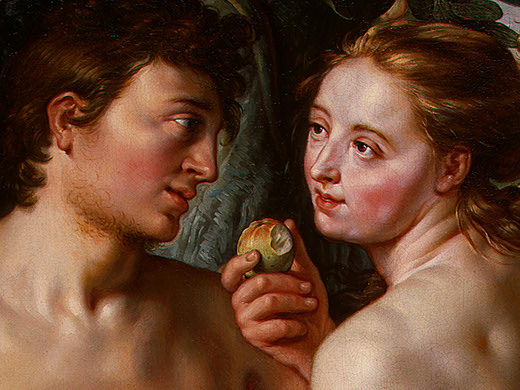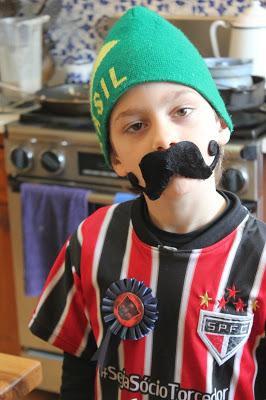An Elegy for Gender? The Encroachment of Androgyny
Posted on September 26, 2015
"REALLY? You think you received something different from your mother and father?" is a question my college student daughter was recently asked in disbelief by a group of young women and a professor. These are all Christians. In their perspective, mother and father are interchangeable in terms of what they give their children--neither has something unique to give that the other could not just as easily give--if it was in their personality to do so. Man and woman are just not that different.
So here we are, having to defend the uniqueness of gender. In spite of having all of art history and the canon of literature defending in image and story the uniqueness of man and woman, as well as biology itself, it is a difficult conversation to navigate. It is not in a list or a description of roles that one could outline the differences in the two genders. It is captured in the heart. But we are now pressed into definitions out of desperation to preserve something so precious that is being lost in this generation.
I cannot understand why it is so attractive for men and women not to have unique contributions to the world. And the people that are pushing hard for this are women...and the men that take up their cause. Do we really need to begin a different kind of feminism: The need for Woman? I think that probably women just don't want the unique aspect of Woman to be what it is. Power, influence, recognition, worldly reward seem stacked on the other side.
This position--that women and men are not essentially different is nothing other than gnostic. Gnosticism is a shunning of the material in favor of the spiritual. It is an elevation of mind and soul over the body. It believes in a special knowledge that frees us from material constraints. This is an ancient heresy that the early Church had to fight against in its understanding of Jesus. Gnostics were uncomfortable with the idea that God came in a body. It is likely that this is what the Apostle John was identifying as the spirit of the antichrist, specifically that Jesus did not come in the flesh.
People are not disembodied minds and souls. They come in bodies. Male bodies and female bodies. Rather than be ignored, these bodies have something to say about our mission and meaning in this world, in the same way that Jesus' body, conceived in and born through the body of a woman, had something to say about his mission.
The primary metaphor in Scripture for God's relationship with humanity is marriage. The Bible begins with marriage and ends with the great marriage feast between God and his people. This image is completely disrupted as our culture lists toward androgyny. When we move toward believing that gender is a cultural construct, we miss a world of meaning that God is revealing.
The next generation is the group of people we should be concerned about as we work on "enlightening" the world that men and women are not distinctly different. That is because we are saying that children don't need fathers and mothers, just parents. It is only a construct of society that a mother would be nurturing the next generation and the father fighting for it. I am concerned that in this worldview, the next generation is neither being nurtured or fought for--the next generation is not really being considered.
My husband and I have been involved in years of healing prayer, and deep in the core of so many is the loss of mother or father love or blessing. The older they get, they are awakened to the unfilled longing to be known and loved in the unique way that a mother loves and knows and a father knows and loves. They become more aware of the holes in their own souls. And though personhood or love or well-being is not scientifically measured, the lack of them is crippling.
My daughter has not been raised in an ideology but within a theology. So when someone tries to categorize her and dismiss her arguments as "complementation" or "you just think that because..."or she tries to have a genuine discussion free of labels and power moves, she is shocked to find that even among Christians there is a politically driven way to think, and any thought outside of that stream is dubbed "unintellectual" or "narrow."
I want to explore who has a narrow view of women. I think my daughter has the more expansive view, as she thinks that women actually can do things men can't do. She actually believes that women are so important that they better not sabotage their own contributions. She believes that a mother is so important that not to have one is a travesty that only God can redeem.
I am not saying that every child who is missing a mother or a father is going to limp through life. A single parent who understands the masculine and feminine and the limitation of what he or she can give, can also search for other ways for the church at large and for spiritual fathers or mothers to bring that blessing into a child's life. I have seen many single parents live this out in the context of prayer, presence, and the community of Holy Church.
Karl Stern, in his book Flight from Woman, describes two ways of knowing. Whether or not one agrees with the labels he gives them, the paradigm is helpful. One way of knowing is by analyzing parts of a whole, thereby coming to know the whole. The second way of knowing is by embracing the whole, thereby coming to know the whole. He calls the first a masculine way of knowing and the second a feminine way of knowing. He goes on to show how since the Enlightenment we have been fleeing from the feminine way of knowing and exalting the masculine way of knowing. By doing this, we only partially know our world and the people in it.
In an amazing twist, Stern takes on four philosophers who exalt the masculine way of knowing over and against the feminine way of knowing and shows how they came to their very positions THROUGH a feminine way of knowing--through dreams and revelations. So even as they dismiss the feminine and exalt the masculine, their own ideas depended on the feminine.
In our exaltation of the masculine way of knowing over time, it is possible that we are even losing the capacity to receive something that is not scientifically verifiable as real and true, which is so much of our human reality--love, forgiveness, nurture, and so on.
This is not to say that women cannot know in masculine ways or men in feminine ways. The hope is that we are blessed by our mothers and fathers in such ways that we have an integrated capacity to know. Nevertheless, there is a special way that women represent the transcendent movement of the feminine in the world, and that men represent the transcendent masculine, and both must bless the next generation with their powers and instincts that young men and women might not be trapped in a very small universe, such as the one they are living in now.
The disregarding of feminine ways of knowing naturally leads to a disintegration of our understanding of first: women, and secondly: men. This is because personhood, while it can be studied and appreciated even from a scientific perspective, is also mysterious and often best expressed in and through art and poetry.
Women's bodies are not just different. The way they think is different. The way they know is different. The way they see is different. The way they process is different. And I would hate for all of this to go out of the world in our day.
The disintegration of Feminine and Masculine as movements in the universe will lead to chaos in family and culture. If children don't need mothers and fathers but only loving caretakers, then why not same sex parents? And eventually...why not polyamorous families in which three people marry each other--isn't the love of three better than the love of two? After all, we have reduced child rearing to making sure the basics are covered: food, clothing, sleep, shelter, education. A mother being bodily present in real time is no longer of primary importance in the shaping of a person.
Mothers impart something of LIFE that is not recoverable somewhere else. Yes, a mother has a womb, and though science may someday be able to grow a baby outside of it, I think we still have the remnant of understanding that some deep psychological piece would be unformed in a child grown outside the body of a mother. So we still agree that being in a mother's body is essential for the first nine months of a child's life, and that the mother is imparting something other than the cells and food. She is providing personhood.
The mother also has breasts that were put there to nourish the next generation, and her body tells us something of God's intent. But the breast is not just to make the healthiest food for a baby. Something happens in a baby's person when he or she is held close to the mother hour upon hour, when her body says, "You cannot be away from this tiny person for very long or else this little one will go hungry." The father was not given the body to nurture the next generation in the same way. Mothers have a unique calling to nurture the next generation that involves their bodies.
The more we conveniently reduce our own unique contribution to the next generation, the less responsibility we feel, and the more children suffer from anxiety, depression, and lack of direction. And the less we want to be with them.
I have written more extensively about womanhood on this blog in my article, "What is a Woman?" In that article I speak to the conclusions that can be drawn from the importance of the uniqueness of a woman's body for all women, not just those who will nurture children.
The loss of our understanding of Man and Woman is real. But even more real is the God who created Man and Woman in his image and is always at work in restoring what has been lost. So we can never lose hope, and we have to live into our callings in such a way that we awaken that true desire in the world for Father and Mother, which, even in deprivation and loss, can lead one to God, the Father, and Holy Church, the Mother.




